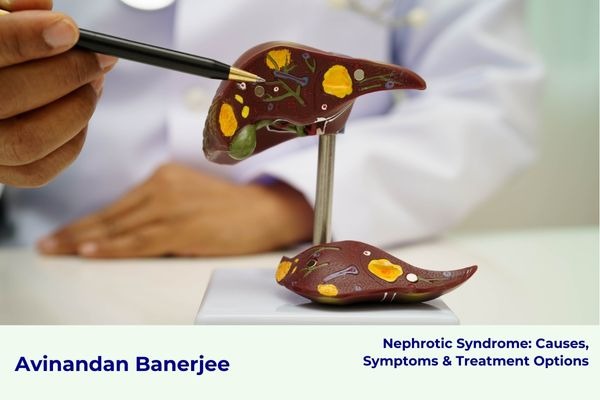Nephrotic Syndrome: Causes, Symptoms & Treatment Options
Learn about nephrotic syndrome, its causes, symptoms, and available treatment options. Understand how to manage this kidney condition effectively.
Dr. Avinandan Banerjee
4/5/20252 min read


Nephrotic Syndrome: Causes, Symptoms & Treatment Options
Expert Insights by Dr. Avinandan Banerjee
Nephrotic syndrome is a kidney disorder characterized by excessive protein loss in urine, leading to swelling, high cholesterol, and an increased risk of infections. Dr. Avinandan Banerjee, a leading kidney specialist, explains its causes, symptoms, and available treatment options.
What Causes Nephrotic Syndrome?
Nephrotic syndrome occurs when the glomeruli, the tiny kidney filters, become damaged and allow too much protein to leak into the urine.
Primary Causes (Kidney-Related):
Minimal Change Disease (MCD): Common in children, often responds well to steroids.
Focal Segmental Glomerulosclerosis (FSGS): A progressive condition that can lead to kidney failure.
Membranous Nephropathy: An immune-related disorder seen in adults.
Secondary Causes (Underlying Conditions):
Diabetes (Diabetic Nephropathy) – A leading cause in adults.
Lupus (Lupus Nephritis) – An autoimmune disease affecting the kidneys.
Infections (Hepatitis B, Hepatitis C, HIV) – Can trigger kidney damage.
Medications (NSAIDs, Antibiotics) – Long-term use can harm kidney function.
Symptoms of Nephrotic Syndrome
According to Dr. Avinandan Banerjee, common signs include:
✅ Severe swelling (edema): Mainly in the legs, feet, and around the eyes.
✅ Foamy urine: Due to excess protein loss.
✅ Weight gain: Resulting from fluid retention.
✅ Fatigue & weakness: Caused by low protein levels.
✅ High cholesterol levels: Due to abnormal fat metabolism.
✅ Increased infection risk: As protective proteins are lost.
Diagnosis of Nephrotic Syndrome
To confirm the condition, doctors may recommend:
✔ Urine Test: Detects protein levels.
✔ Blood Test: Measures kidney function and cholesterol.
✔ Kidney Biopsy: Identifies the exact cause of kidney damage.
Treatment Options for Nephrotic Syndrome
1. Medications
Steroids (Prednisolone): Effective for Minimal Change Disease.
Immunosuppressants: Help in autoimmune-related cases.
ACE Inhibitors & ARBs: Reduce protein loss and control blood pressure.
Diuretics: Help reduce swelling.
Statins: Lower cholesterol levels.
Antibiotics & Vaccines: Prevent infections.
2. Diet & Lifestyle Changes
Low-salt diet to control swelling.
Moderate protein intake to avoid kidney stress.
Limit saturated fats & cholesterol to prevent heart disease.
Stay hydrated and avoid alcohol & smoking.
3. Long-Term Monitoring
Since nephrotic syndrome can recur, regular kidney function tests, blood pressure monitoring, and follow-ups with a nephrologist like Dr. Avinandan Banerjee are essential.
Final Thoughts
Nephrotic syndrome can be managed with timely diagnosis, medications, and lifestyle changes. If you experience persistent swelling, foamy urine, or unexplained weight gain, consult Dr. Avinandan Banerjee for expert guidance.
For appointments and personalized kidney care, reach out today!
CONTACT US
For Appointment: +91 91637 18654
Mail Us: dravinandanbanerjee2024@gmail.com
Our Address:
Manipal Hospital, Kolkata
Ananda Clinic, Diamond Harbour Rd
Dr. Avinandan Banerjee
Dr. Avinandan Banerjee is a leading nephrologist with over 12 years of experience, providing expert kidney care with a compassionate approach.